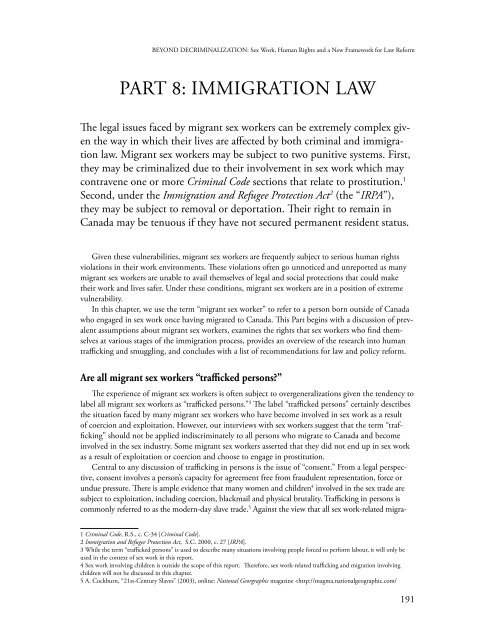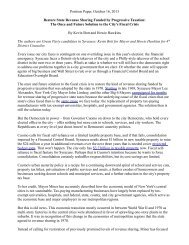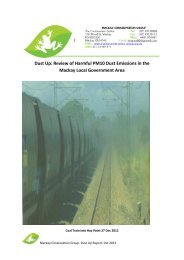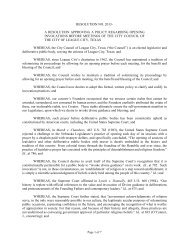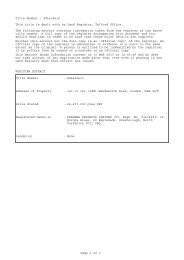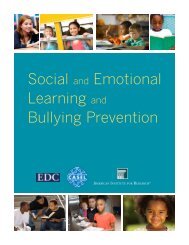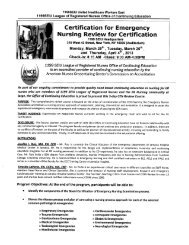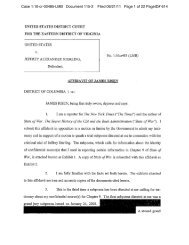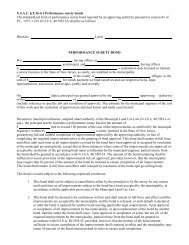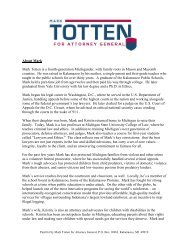Beyond Decriminalization: Sex-work, Human Rights and a New ...
Beyond Decriminalization: Sex-work, Human Rights and a New ...
Beyond Decriminalization: Sex-work, Human Rights and a New ...
- No tags were found...
You also want an ePaper? Increase the reach of your titles
YUMPU automatically turns print PDFs into web optimized ePapers that Google loves.
BEYOND DECRIMINALIZATION: <strong>Sex</strong> Work, <strong>Human</strong> <strong>Rights</strong> <strong>and</strong> a <strong>New</strong> Frame<strong>work</strong> for Law ReformPART 8: IMMIGRATION LAWThe legal issues faced by migrant sex <strong>work</strong>ers can be extremely complex giventhe way in which their lives are affected by both criminal <strong>and</strong> immigrationlaw. Migrant sex <strong>work</strong>ers may be subject to two punitive systems. First,they may be criminalized due to their involvement in sex <strong>work</strong> which maycontravene one or more Criminal Code sections that relate to prostitution. Second, under the Immigration <strong>and</strong> Refugee Protection Act (the “IRPA”),they may be subject to removal or deportation. Their right to remain inCanada may be tenuous if they have not secured permanent resident status.Given these vulnerabilities, migrant sex <strong>work</strong>ers are frequently subject to serious human rightsviolations in their <strong>work</strong> environments. These violations often go unnoticed <strong>and</strong> unreported as manymigrant sex <strong>work</strong>ers are unable to avail themselves of legal <strong>and</strong> social protections that could maketheir <strong>work</strong> <strong>and</strong> lives safer. Under these conditions, migrant sex <strong>work</strong>ers are in a position of extremevulnerability.In this chapter, we use the term “migrant sex <strong>work</strong>er” to refer to a person born outside of Canadawho engaged in sex <strong>work</strong> once having migrated to Canada. This Part begins with a discussion of prevalentassumptions about migrant sex <strong>work</strong>ers, examines the rights that sex <strong>work</strong>ers who find themselvesat various stages of the immigration process, provides an overview of the research into humantrafficking <strong>and</strong> smuggling, <strong>and</strong> concludes with a list of recommendations for law <strong>and</strong> policy reform.Are all migrant sex <strong>work</strong>ers “trafficked persons?”The experience of migrant sex <strong>work</strong>ers is often subject to overgeneralizations given the tendency tolabel all migrant sex <strong>work</strong>ers as “trafficked persons.” The label “trafficked persons” certainly describesthe situation faced by many migrant sex <strong>work</strong>ers who have become involved in sex <strong>work</strong> as a resultof coercion <strong>and</strong> exploitation. However, our interviews with sex <strong>work</strong>ers suggest that the term “trafficking”should not be applied indiscriminately to all persons who migrate to Canada <strong>and</strong> becomeinvolved in the sex industry. Some migrant sex <strong>work</strong>ers asserted that they did not end up in sex <strong>work</strong>as a result of exploitation or coercion <strong>and</strong> choose to engage in prostitution.Central to any discussion of trafficking in persons is the issue of “consent.” From a legal perspective,consent involves a person’s capacity for agreement free from fraudulent representation, force orundue pressure. There is ample evidence that many women <strong>and</strong> children involved in the sex trade aresubject to exploitation, including coercion, blackmail <strong>and</strong> physical brutality. Trafficking in persons iscommonly referred to as the modern-day slave trade. Against the view that all sex <strong>work</strong>-related migra- Criminal Code, R.S., c. C-34 [Criminal Code]. Immigration <strong>and</strong> Refugee Protection Act, S.C. 2000, c. 27 [IRPA]. While the term “trafficked persons” is used to describe many situations involving people forced to perform labour, it will only beused in the context of sex <strong>work</strong> in this report. <strong>Sex</strong> <strong>work</strong> involving children is outside the scope of this report. Therefore, sex <strong>work</strong>-related trafficking <strong>and</strong> migration involvingchildren will not be discussed in this chapter. A. Cockburn, “21st-Century Slaves” (2003), online: National Georgraphic magazine


